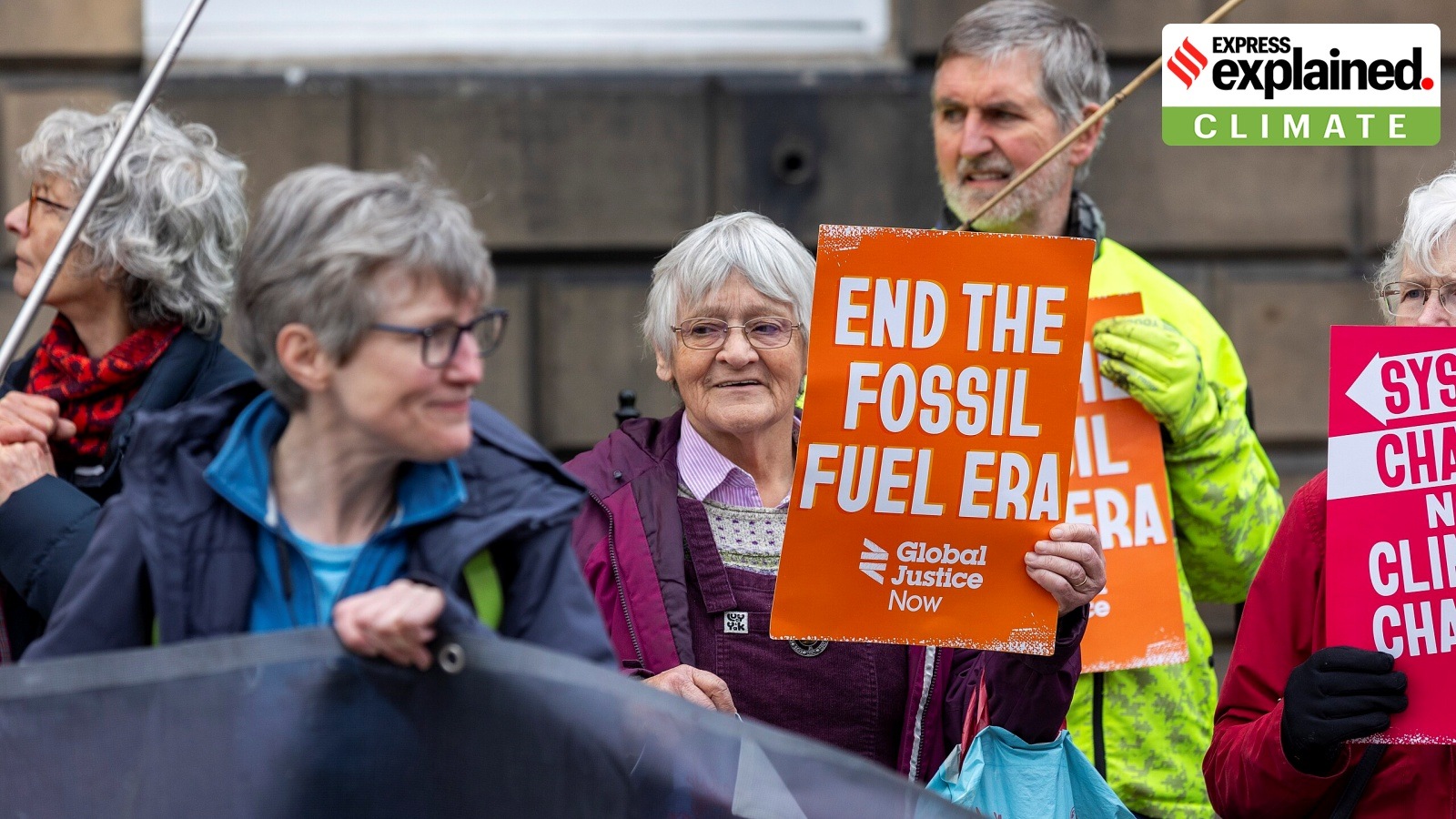ICJ begins hearing on landmark climate change case: Why is this significant?
The case is expected to have significant implications for the increasing number of climate-related lawsuits being filed everywhere. It could potentially also influence the negotiations at the annual climate talks
 Scottish climate change organisations demonstrate outside the official residence of the Scottish First Minister in April 2024. (Photo: Wikimedia Commons)
23.4.24
Friends of the Earth Scotland climate change demonstration outside the official residence of the Scottish First Minister.
More info from:
Connal Hughes
FOE Scotland
chughes@foe.scot
or
Eilidh Stanners
Communications Officer
Friends of the Earth Scotland
24hr media line: 0131 243 2715
estanners@foe.scot
Picture Copyright:
Iain McLean,
52 Harelaw Ave
Glasgow
G44 3HY
07901 604 365
photomclean@googlemail.com
https://www.iainmclean.com
All Rights Reserved
No Syndication
Free for editorial use by third parties only in connection with the commissioning client's press-released story. All other rights are reserved.
Scottish climate change organisations demonstrate outside the official residence of the Scottish First Minister in April 2024. (Photo: Wikimedia Commons)
23.4.24
Friends of the Earth Scotland climate change demonstration outside the official residence of the Scottish First Minister.
More info from:
Connal Hughes
FOE Scotland
chughes@foe.scot
or
Eilidh Stanners
Communications Officer
Friends of the Earth Scotland
24hr media line: 0131 243 2715
estanners@foe.scot
Picture Copyright:
Iain McLean,
52 Harelaw Ave
Glasgow
G44 3HY
07901 604 365
photomclean@googlemail.com
https://www.iainmclean.com
All Rights Reserved
No Syndication
Free for editorial use by third parties only in connection with the commissioning client's press-released story. All other rights are reserved.The recently concluded annual climate talks in Baku, Azerbaijan, ended in disappointment for the developing countries. The main agreement negotiated at this conference promised to mobilise just $300 billion a year in climate finance for the developing countries, far less than the $1.3 trillion a year they had been demanding in line with their requirements assessed by several studies.
The refusal of the developed nations to fully meet their obligations on climate finance follows the continuing neglect of their responsibilities on emission cuts.
To hold the developed countries to account for their climate responsibilities, the developing nations, particularly the small island states, have now taken their concerns to another forum, the International Court of Justice (ICJ), the main judicial arm of the United Nations. On Monday (December 2), the ICJ began hearings in a case that seeks its advisory opinion on the obligations of countries on climate change under existing international laws, and the legal consequences of those obligations.
The case is expected to have significant implications for the increasing number of climate-related lawsuits being filed everywhere. It could potentially also influence the negotiations at the annual climate talks.
The case
The case results from a resolution passed by the UN General Assembly (UNGA) in March last year, at the initiative of Vanuatu, a small country in the Pacific Ocean located about 2,000 km northeast of Australia. Like several other small island states, Vanuatu is one of the most vulnerable countries, with its existence threatened by rising sea levels.
Vanuatu moved a proposal seeking an advisory opinion of the ICJ on climate change in September, 2021. It received support from a large number of countries, and eventually the UNGA, in March last year, adopted the resolution that was co-sponsored by 132 countries.
The resolution seeks answers to two specific questions. One, what are the obligations of the countries under international laws to protect the climate system. Two, what are the legal consequences under these obligations for countries that have caused harm to this climate system.
Although the 1994 UN Framework Convention on Climate Change (UNFCCC) and the 2015 Paris Agreement are the two international laws that deal exclusively with climate change, there are several other legal instruments which are relevant to the issue. These include the UN Convention on the Law of the Seas, the Convention on Biological Diversity, the Convention to Combat Desertification, the Universal Declaration on Human Rights, the International Covenant on Civil and Political Rights and the UN Charter itself.
The UNGA resolution has sought the ICJ opinion on the climate obligations of countries in light of these, and other related, international laws.
The significance
The two-week hearings at ICJ would result in only an advisory opinion, as sought by the UNGA resolution. But it could have far-reaching ramifications.
Currently, the UNFCCC defines the climate obligations of countries based on their share of historical emissions. A group of about 40 rich and developed countries, which had the maximum share of historical emissions till then, were held mainly responsible for causing climate change. These countries were asked to reduce their emissions, and also help the developing nations, through provision of finance and technology, in fighting climate change.
Over the years, the rich and developed countries have not just managed to largely ignore these obligations, but also succeeded in transferring a part of their burden on the developing countries.
The ICJ ruling can potentially show that the obligations of the developed nations stem not just from the UNFCCC and the Paris Agreement, but also from several other international legal frameworks. This can become a new argument in the climate negotiations. More importantly, defining the legal consequences for climate change can have implications for demands of small island states that they be compensated for the damage caused by climate change.
At the minimum, the outcome of this case could become a precedent for the thousands of climate lawsuits that have been filed in recent years, seeking accountability from governments and corporations. As of 2023, more than 2,600 lawsuits have been filed worldwide that seek courts to adjudicate matters on climate change, or rely on climate arguments to decide issues of public importance. A few of these have already resulted in landmark judgments. For instance, earlier this year, the European Court of Human Rights held that Switzerland had failed to meet its greenhouse gas emission reduction targets, and thus violated the human rights of its citizens.
Several countries are also enacting climate-specific legislation. In April this year, India’s Supreme Court had expanded the scope of the fundamental rights to life and equality to include the right to be free from adverse impacts of climate change.
Record representations
The importance of this case can be gauged also from the record number of representations that have been made before the ICJ. The court has already received over 90 written submissions from countries and organisations. At least 97 countries and a dozen international organisations are scheduled to participate in the hearings, which too is a record for any case at ICJ.
Even countries that accept ICJ’s authority only in a limited manner, including India, China and the United States, are participating in this case. In a statement on Monday, the US State Department said it welcomed the ICJ hearings.
“Although the United States remains of the view that climate change is best addressed through diplomatic efforts, it welcomes the opportunity to share its legal views and engage with States and the Court on the questions posed, including through these public hearings,” it said.
“The UN climate change regime, and particularly the 2015 Paris Agreement, provides the critical international legal framework for States’ cooperation in addressing the collective action problem of climate change. States jointly designed this regime to tackle this uniquely complex global problem in a cooperative manner,” the US said.
The US is scheduled to make a submission in the case on Wednesday. India’s submission will happen on December 5.
- 01
- 02
- 03
- 04
- 05






































